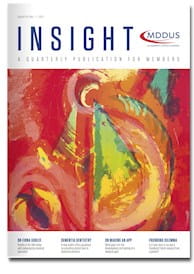MUCH has been written about the need to determine competence and what information a patient should have when providing valid consent to treat – but there is also a vital third element: ensuring free choice.
Respect for autonomy is a fundamental ethical principle underpinning medical ethics. We must respect the right of any person to make decisions affecting their own bodies and lives. This also means protecting them from adverse influences which interfere with their ability to make a free choice.
In Consent: patients and doctors making decisions together, the GMC states: "Patients may be put under pressure by employers, insurers, relatives or others, to accept a particular investigation or treatment. You should be aware of this and of other situations in which patients may be vulnerable. Such situations may be, for example, if they are resident in a care home, subject to mental health legislation, detained by the police or immigration services, or in prison.
"You should do your best to make sure that such patients have considered the available options and reached their own decision. If they have a right to refuse treatment, you should make sure that they know this and are able to refuse if they want to."
Here the GMC highlights several situations where patients may be adversely influenced in their decision making. Many relatives and friends do influence patient choices – but this must not amount to substituting their decision for that of the patient.
For any treatment decision, the patient’s choice depends on various factors, such as the impact on their day-to-day life, family responsibilities, employment, time of year and even personal foibles. As healthcare practitioners we need to be sensitive to these matters and be alert to any influence which crosses a line, even from a practitioner themselves.
Tensions often arise when a patient refuses treatment. A clinician can explore the reasons for making a decision which may not appear to be in a patient’s own best interests, but care must be taken not to inappropriately pressurise a patient to make a particular treatment choice. It is one thing to check the patient’s beliefs and reasons for their choice but it is wrong to try to impose a choice upon them. Equally those close to a patient should not seek a decision of their preference as opposed to the patient’s own.
In the landmark case of Re T (Adult) 1992, the judgement looked closely at these issues. T was a 20-year-old pregnant patient who was injured in a car accident and ultimately needed to have blood transfusions after complications arising from a caesarean section. On admission to hospital she had indicated that she was an ex-Jehovah’s Witness and information from the patient and those close to her demonstrated that her lifestyle departed from the teachings of that religion.
Although there had been no discussions with the patient about transfusion, after spending time with her mother, a practising Jehovah’s Witness, T announced that she did not want to have blood transfusions. At that time it was not anticipated that she would require blood or blood products.
Later when she needed to have blood she continued in her refusal. Her father took the matter to court and it eventually went to the Court of Appeal where it was found that T had been pressurised by her mother. This, along with the effect of drugs she had at the time, rendered her refusal invalid. The decision was that the transfusions could proceed.
In the Court of Appeal decision Lord Staughton wrote: "... every decision is made as a result of some influence: a patient's decision to consent to an operation will normally be influenced by the surgeon's advice as to what will happen if the operation does not take place. In order for an apparent consent or refusal of consent to be less than a true consent or refusal, there must be such a degree of external influence as to persuade the patient to depart from her own wishes, to an extent that the law regards it as undue. I can suggest no more precise test than that."
The ethical and legal position is clear that patients must be allowed to make their own decision on consent without undue influence. This can on occasion lead to concerns about valid consent. If such a case arises it is important to seek appropriate legal advice and if in any doubt contact MDDUS for guidance.
Dr Gail Gilmartin is medical and risk adviser at MDDUS
This page was correct at the time of publication. Any guidance is intended as general guidance for members only. If you are a member and need specific advice relating to your own circumstances, please contact one of our advisers.
Read more from this issue of Insight

Save this article
Save this article to a list of favourite articles which members can access in their account.
Save to library